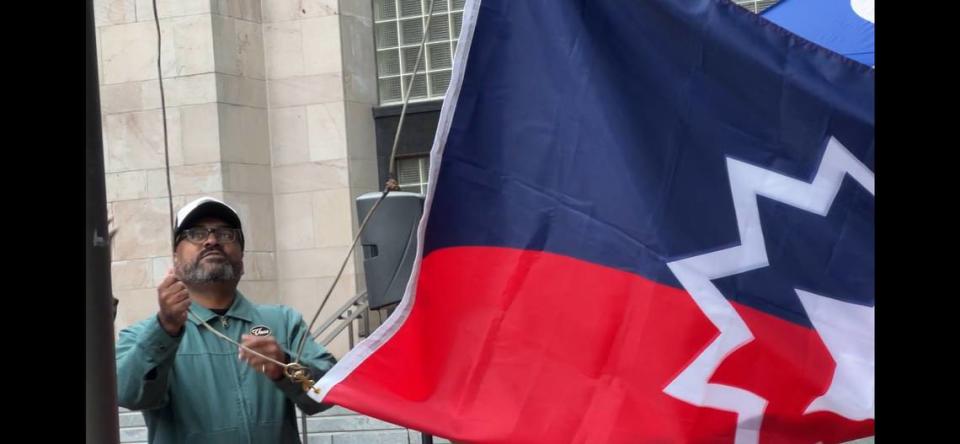Bellingham officials challenged to ‘do the work’ during city’s Juneteenth flag ceremony
Bellingham officials raised the Juneteenth flag at City Hall during a ceremony that was part of a City Council committee meeting Monday morning.
The event came just days after a racially motivated assault on a Whatcom Middle School student, an incident that emcee Terrence “Teejay” Morris highlighted in his remarks to about 50 people who gathered at the City Hall flag plaza.
“When you think about our community and what happened, what Wednesday? A little Black boy was going home and he was beaten because he was Black. Black is beautiful. Black is kind. But sometimes being Black is hard to do,” Morris told those in attendance.
Morris challenged spectators and participants to make Bellingham a welcoming community for all people.
“What do I do, other than Juneteenth, to show that my Black community members feel heard, supported and honored? If you look at (your phone) and everybody looks like you and agrees with you, it means that you ain’t doing the work. Harsh truth,” he said.
Monday’s event featured songs, poems and an explanation of the holiday, which was recognized as a federal holiday by the U.S. in 2021.
City Councilman Edward “Skip” WIlliams sang “Lift Every Voice and Sing,” a hymn that’s become known as the Black National Anthem.

Juneteenth symbolizes the day on June 19, 1865, when the last slaves learned that the Civil War was over and that they had been freed.
U.S. President Abraham Lincoln issued the Emancipation Proclamation on Sept. 22, 1862, in the midst of the Civil War. By the time the war ended on May 9, 1865, Union troops had already begun freeing slaves throughout the South. But it took until June 19, 1865, for the last slaves in Texas to learn of their freedom.
Even so, it wasn’t until the 13th Amendment was ratified on Dec. 6, 1865, that all slaves — including those in states that weren’t part of the Confederacy — were legally free, said Lance Jones, a member of the newly formed Whatcom Racial Equity Commission.
“We’ll never know for sure, but recent estimates state that around 6 million people lived and died in the American slave industry. Four million were ultimately declared free. I’m a resident of Whatcom County, and I’m a descendant of enslaved people,” Jones told the crowd.
It’s a toll that U.S. historians are now recognizing as an American genocide, along with the legacy of Jim Crow and the violence of segregation.
Morris told the crowd that when he was young, he asked his grandmother why the families of freed slaves honor an event so horrific.
“I said, ‘Why do we celebrate something that’s so painful?’ ‘Because,’ she said, ‘if we don’t remember the past, we’ll repeat it in the present and we’ll keep repeating it in the future.’”

